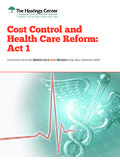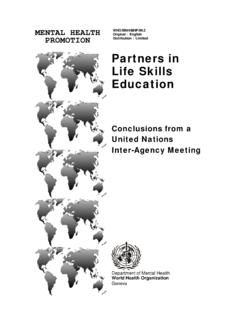Transcription of QI M I H CARE - The Hastings Center
1 MARYANNBAILY MELISSABOTTRELLJOANNELYNN BRUCEJENNINGST H E.. Hastings .. CENTERA HASTINGSCENTERSPECIALREPORTTHEETHICS OFUSINGQI METHODS TOIMPROVEHEALTHCAREQUALITY ANDSAFETYR ights were not granted to include this image in electronic refer to the printed 2006 / Hastings Center REPORTG eorge J. Agich, PhDBowling Green State UniversityBowling Green, OHMary Ann Baily, PhDThe Hastings CenterGarrison, NYPaul Batalden, MDDartmouth Medical SchoolHanover, NHNancy Berlinger, PhD, MDivThe Hastings CenterGarrison, NY*Melissa Bottrell, MPH, PhDNational Center for Ethics in health care , Veterans health AdministrationSeattle, WA*Michael Carome, MDDHHS Office for Human ResearchProtectionsRockville, MDDavid Casarett, MD, MACenter for health Equity Researchand PromotionPhiladelphia VA Medical CenterPhiladelphia, PAJanet Corrigan, PhDNational Quality ForumWashington, DCLinda Cronenwett, PhD, RN.
2 FAANU niversity of North Carolina atChapel Hill, School of NursingChapel Hill, NCFrank Davidoff, MD, MACPI nstitute for Healthcare ImprovementWethersfield, CTNancy Neveloff Dubler, LLBM ontefiore Medical CenterBronx, NY*Arnold Farley, PhDCenters for Medicare and MedicaidServicesBaltimore, MD*J. Michael Fitzmaurice, PhDAgency for Healthcare Research andQualityRockville, MD*Ellen Fox, MDNational Center for Ethics in health care , Veterans health AdministrationWashington, DCBrent James, MD, MSTATI ntermountain Institute for HealthCare Delivery ResearchSalt Lake City, UT*Stephen F. Jencks, MD, MPHC enters for Medicare and MedicaidServicesBaltimore, MDBruce Jennings, MACenter for Humans and NatureNew York, NYRobert J.
3 Levine, MDYale UniversityNew Haven, CTJoanne Lynn, MD, MA, MSThe RAND CorporationArlington, VAKaren Maschke, PhDThe Hastings CenterGarrison, NYEthel Mitty, EdD, RNNew York University College of NursingNew York, NYRobyn Y. Nishimi, PhDNational Quality ForumWashington, DCMargaret O Kane, MHAN ational Committee for Quality AssuranceWashington, DCPaul Schyve, MDJoint Commission on Accreditationof Healthcare OrganizationsOakbrook Terrace, ILTheodore Speroff, PhDVanderbilt University Medical CenterNashville, TNSean Tunis, MD, MScHealthTechSan Francisco, CAMatthew K. Wynia, MD, MPHA merican Medical Association Institute for EthicsChicago, IL*Note:The authors of this report are re-sponsible for its content.
4 Statements inthis report should not be construed asendorsement by the Agency for health - care Research and Quality or the De-partment of health and Human Services. The federal government employees list-ed above participated in the meeting dis-cussions in an advisory capacity. Howev-er, in addition to the preceding dis-claimer, it should be further emphasizedthat the statements in this report shouldnot be construed as endorsement by theDepartment of Veterans Affairs or anyother department of the govern-ment, nor do they represent the policiesof any federal departments, agencies, PARTICIPANTSO rganizational affiliations for identification purposes only; affiliations current as of 2006 This project was funded by theAgency for Healthcare Researchand Quality, grant #1R13HS13369.
5 S3 SPECIAL REPORT / The Ethics of using QI Methods to Improve health care Quality and SafetyPREFACEP owerful forces of change are at work within theAmerican health care system. The public debateconcerning health care financing and access to in-surance coverage is intensifying. But below the surface ofthe media and policy debate about cost and access, a qui-eter but perhaps more significant process of change isunder way: the transformation of health care managementand delivery indeed, health professional work itself through health care quality innovative, interdisciplinary quality improvement(QI) movement has begun to significantly upgrade deliv-ery of health care in the United States.
6 Taking its cue fromreform approaches in other industries, and driven espe-cially by studies indicating a shockingly widespread inci-dence of medical errors and a striking lack of consistencyin the standard of care patients receive in different facili-ties and from different practitioners, the QI movementhas arrived in health care . using knowledge gained fromthe disciplines of medicine, nursing, health care manage-ment, and medical and health services research, it at-tempts to mobilize people within the health care system towork together in a systematic way to improve the carethey provide.
7 In this work, discipline-specific knowledgeis combined with experiential learning and discovery tomake issues arise in QI because attempts to improvethe quality of care for some patients may sometimes inad-vertently cause harm, or may benefit some at the expenseof others, or may waste scarce health care resources. Ethi-cal issues also arise because some activities aimed at im-provement have been interpreted as a form of medical re-search in which patients are used as subjects. If this inter-pretation is correct, QI would come under the same com-plex review and regulatory requirements that have beenset up to govern biomedical and other types of is this type of regulation necessary, given what QI in-volves?
8 Is it the most effective and reasonable way to regu-late QI to ensure that it is carried out in an ethical fash-ion? These are important questions, both conceptuallyand practically. Thus far, however, relatively few attemptshave been made to address QI from an ethical perspective,and the interface between research and quality improve-ment has not been adequately explored or agencies with responsibilities in this area havedisagreed on where the interface between medical researchand QI lies and how it should be handled. (See Box 1 fora particularly dramatic example of such a conflict.)
9 Thestrict ethical rules of oversight, regulation, and patientconsent for human subjects research, including the re-quirement for institutional review board (IRB) approval,have significant implications for the feasibility and cost ofpursuing QI activities. More specifically, the mechanismdeveloped to govern ethical conduct in one importantarea human subjects research could have the perverse,if unintended, consequence of interfering directly with anequally important ethical imperative in another area that is, unceasing efforts by health care professionals tomake clinical care safer and more effective.
10 The currentstate of uncertainty about what is ethically and legally re-quired to safeguard participants in QI activities has al-ready become a disincentive to engage in QI, making itmore difficult to bring about the system transformationurgently needed if health care is to be made better andsafer for 2002 The Hastings Center began a project to ad-dress these issues and to investigate more generally theethical and value issues that arise in the theory and prac-tice of quality improvement in health care . The project, ti-tled The Ethics of Improving health care Quality andSafety, was funded by grant #1R13HS13369 from theAgency for Healthcare Research and Quality (AHRQ).








